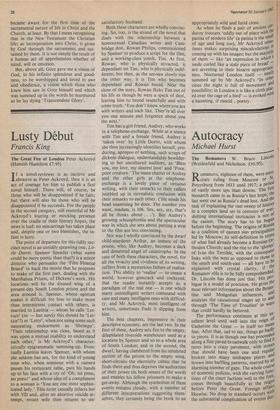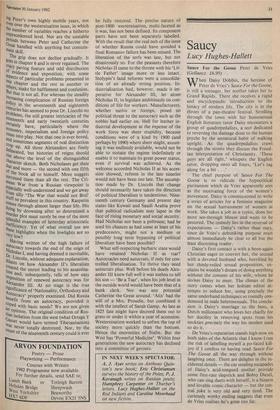Autocracy
Michael Hurst
The Romanovs W. Bruce Lincoln (Weidenfeld and Nicholson. £10.95).
Romanovs, eighteen of them, were auto- crats ruling from Moscow or St. Petersburg from 1613 until 1917; a Pert°°, of vastly more ups than downs. The firs' monarch came in as Russia's last hope; the last went out as Russia's dead loss. And the task of explaining the vast sweep of history in a complex land set in contexts of ever- shifting international intricacies is not the easiest. The story has to be begun before the beginning. The origins of Rus!13 as a coalition of eastern slay principalities led by Moscow; its self-definition in terms of what had already become a Russian 9t-, thodox Church; and the rise to the ‘glories of Ivan the Terrible, with the consequent links with the west as opposed to those iri the south and south-east — all have to he explained with crystal clarity, if the Romanov role is to be fully comprehended' Dr. Lincoln has done just that. His pro- logue is a model of precision. He gives the most relevant information about the BYzarla tine and Mongolian influences, all, analyses the causational stages up to ad' through 'The Time of Troubles' in ways that could hardly be bettered. The performance continues at this ex- cellent level until well into the reign o' Catherine the Great — in itself no mean feat. After that, sad to say, things go badly to pieces. It is as though one has proceeded along a fine paved broadwalk only to find It turns into a crazy pavement, with stories that should have been one and regale'', broken into many mishapen pieces an ' strewn into baffling patterns, marred by an alarming number of gaps. The whole coarse of domestic policies, with the varying func- tions of the court factions well to the fore' comes through beautifully in the reigns before Peter the Great. Foreign affairs likewise. No drop in standard occurs with the substantial complication of events din' ing Peter's own highly mobile years, not even over the westernisation issue, in which the number of variables reaches a hitherto unprecedented level. Nor are the unstable periods between Peter and Catherine the Great handled with anything but consum- mate skill. The grip does not decline gradually. It goes in chapter 6 and is never regained. The crazy paving feature and odd distribution of evidence and exposition, with some aspects of particular problems presented in one chapter and the rest in another or others, make for bafflement and confusion. But that is not all. For whereas the steadily Increasing complication of Russian foreign policy in the seventeenth and eighteenth centuries has seemed to pose Dr. Lincoln no problems, the still greater intricacies of the nineteenth and early twentieth centuries cenainlY have, particularly where the ee„°11°n1Y, imperialism and foreign policy come into play. Not that one is ever bored, and sometimes segments of real distinction crop °P. All three Alexanders are finely delineated, but histories of reigns should nse above the level of the distinguished character sketch. Both Nicholases get their due and more — the second with one fifth of the book all to himself. More nuggets surround them than all the rest. The Cri- mean War from a Russian viewpoint is especially well-understood and we get away from silly 'The War that would not Boil' stuff so prevalent in this country. Rasputin comes through almost larger than life. His d 3ring by drowning after so determined a Murder plot must surely be one of the m aristocratic Iu,_efficiency. Yet of what overall use are these highlights when the lowlights are so very low? Having written of the high failure of autocracy towards the end of the reign of Nicholas I, and having deemed it inevitable, 1-1'. Lincoln, without adequate explanation, dilates on how Alexander II's liberalism created the unrest leading to his assassina- ,u0n and, subsequently, tells of how easy Imposition of renewed autocracy was for Alexander III. At no stage is the true Significance of 'Nationality, Orthodoxy and benefit properly examined. Did Russia benefit from an autocracy, provided it Coped with basic needs? We are not given an °Pinion. The original condition of Rus- sian isolation from the west (what Ortega Y
asset would have termed Tibetanisation) was never totally destroyed. Nor, by the onset of the nineteenth century could it ever
be fully restored. The precise nature of post-1800 westernisation, multi-faceted as it was, has not been defined. Its component parts have not been separately labelled. With the result that the real nub of the issue of whether Russia could have avoided a final Romanov failure has been missed. The liberation of the serfs was late, but not disastrously so. For the peasants therefore Nicholas II came to the throne with his 'Lit- tle Father' image more or less intact. Stolypin's land reforms were a consolida- tion of an already strong position. In- dustrialisation had, however, made it im- perative for Alexander III, let alone Nicholas II, to legislate ambitiously on con- ditions of life for workers. Manufacturers, whether native or foreign, posed no political threat to the autocracy such as the nobles had earlier on. Hell for leather in- dustrial development at the expense of the work force was sheer stupidity, because conditions were of a kind by 1900 (and perhaps by 1890) where sheer might, assum- ing it was endlessly available, would not be able to sustain the regime indefinitely or enable it to maintain its great power status, even if survival was achieved. As the welcome accorded Nicholas II at his acces- sion showed, reform in the late nineties would not have been too late. The assump- tion made by Dr. Lincoln that change should necessarily have taken the direction of political liberalism is tendentious. Nine- teenth century Germany and present day states like Kuwait and Saudi Arabia prove that political radicalism may lapse in the face of rising monetary and social security. Had Nicholas not been a poltroon; had he used his chances as had some at least of his predecessors, might not a medium or possibly long term bypassing of political liberalism have been possible?
What self-respecting barbaric state would have retained Nicholas It as tsar? Autocracies need autocrats, if only for con- trolled liberalisation. To thrive they need autocrats plus. Well before his death Alex- ander III knew full well it was useless to tell his son — 'Be a Tsar', when his job level in the outside world would have been that of a bank clerk. Nor was any potential Catherine the Great around. 'Alb(' had the will of a Mrs. Proudie, but combined it with the intellect of Sarah Camp. As late as 1825 fate might have decreed them out to grass or under it within a year of accession. Westernisation worked to soften the top of society more quickly than the bottom. Hence the enormities of Stalin. But the West has 'Powerful Medicine'. Within four generations the new autocracy has declined into a committee of geronts.



































 Previous page
Previous page